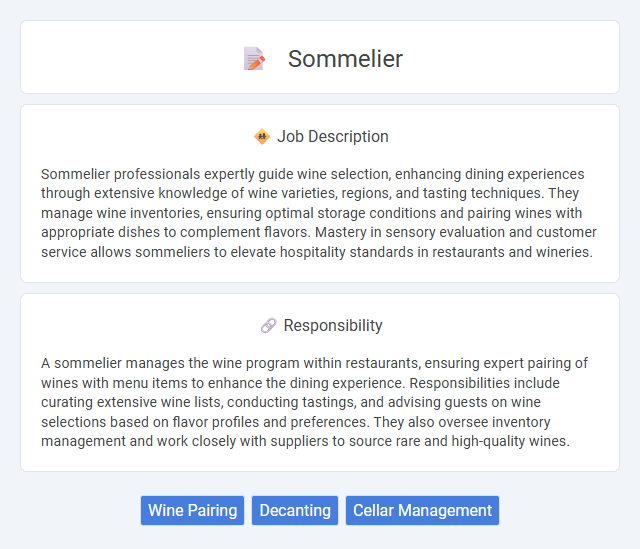
Sommelier professionals expertly guide wine selection, enhancing dining experiences through extensive knowledge of wine varieties, regions, and tasting techniques. They manage wine inventories, ensuring optimal storage conditions and pairing wines with appropriate dishes to complement flavors. Mastery in sensory evaluation and customer service allows sommeliers to elevate hospitality standards in restaurants and wineries.
People with a strong passion for wines and an acute sense of taste and smell are likely to thrive as sommeliers. Those who enjoy continuous learning and can handle high-pressure environments with excellent communication skills might find this career suitable. Individuals who prefer routine tasks or dislike social interaction may be less suited for the dynamic and customer-facing nature of the sommelier role.
Qualification
A sommelier must possess in-depth knowledge of wine varieties, production regions, and tasting techniques, often gained through certification programs such as those offered by the Court of Master Sommeliers or the Wine & Spirit Education Trust (WSET). Strong sensory evaluation skills and a refined palate are essential for accurately pairing wines with food and addressing customer preferences. Effective communication and customer service abilities are also critical to educate guests and enhance their dining experience.
Responsibility
A sommelier manages the wine program within restaurants, ensuring expert pairing of wines with menu items to enhance the dining experience. Responsibilities include curating extensive wine lists, conducting tastings, and advising guests on wine selections based on flavor profiles and preferences. They also oversee inventory management and work closely with suppliers to source rare and high-quality wines.
Benefit
Working as a sommelier likely offers the benefit of deepening expertise in wines and beverages, enhancing the ability to recommend optimal pairings to elevate dining experiences. There is a strong probability that sommeliers gain access to exclusive tastings and industry events, fostering valuable professional networking opportunities. The role may also lead to career advancement in luxury hospitality settings, coupled with potentially competitive compensation.
Challenge
The challenge of a Sommelier job likely lies in mastering an extensive knowledge of wines, including their origins, flavors, and proper pairings with food. It may also involve the ability to anticipate customer preferences and adapt recommendations accordingly in a dynamic dining environment. Balancing technical expertise with excellent interpersonal skills probably demands continuous learning and keen sensory perception.
Career Advancement
Expertise in wine selection, service techniques, and extensive knowledge of wine regions and grape varieties drive career advancement in the sommelier profession. Advancement opportunities include roles such as Head Sommelier, Wine Director, or Beverage Manager, often requiring certifications like the Court of Master Sommeliers or the Wine & Spirit Education Trust (WSET). Networking within fine dining establishments and continuous education on emerging wine trends significantly enhance promotion prospects.
Key Terms
Wine Pairing
A sommelier excels in wine pairing by expertly matching wines with specific dishes to enhance the overall dining experience, considering factors such as flavor profiles, acidity, and texture. Their deep knowledge of varietals, regions, and vintages enables precise selections that complement and elevate the meal. Effective wine pairing supports restaurant reputation and customer satisfaction, often increasing wine sales and optimizing menu offerings.
Decanting
Sommelier expertise in decanting involves carefully pouring wine from its bottle into a decanter to separate sediment and aerate the wine, enhancing its flavor and aroma. Precision in timing and technique during decanting can significantly improve the tasting experience, particularly for vintage reds and full-bodied wines. Mastery in selecting the right decanter type and understanding the wine's characteristics is essential for optimizing its bouquet and complexity.
Cellar Management
Sommelier cellar management involves meticulously organizing and maintaining wine inventories to ensure optimal aging and preservation conditions. This role requires expertise in temperature and humidity control, as well as categorizing wines by region, vintage, and varietal for efficient retrieval. Effective cellar management enhances wine quality and supports seamless service during wine pairings and tastings.
 kuljobs.com
kuljobs.com